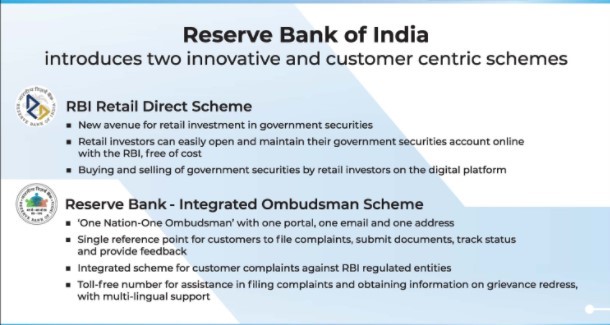[ad_1]

Context:
In recent, Prime Minister Modi launched two customer-centric initiatives of the Reserve Bank of India (RBI) — the RBI Retail Direct Scheme and the Integrated Ombudsman Scheme.
With this, India has opened up the government bond market for retail investors.
RBI has been leveraging technology & innovation for enhancing the efficiency of its services.
RBI’s developmental role is focused on further deepening of financial inclusion and undertaking people centric initiatives. RBI called it as a “major structural reform” and further deepening financial inclusion.
Both, the RBI Retail Direct Scheme and the Reserve Bank – Integrated Ombudsman Scheme will aid in expanding the scope of investment in India while making access to capital markets easier and more secure.
Government securities Background:
- A G-Sec is a tradable instrument issued by the Central Government or the State Governments. It acknowledges the Government’s debt obligation.
- G-Secs carry practically no risk of default and, hence, are called risk-free gilt-edged instruments.
- Gilt-edged securities are high-grade investment bonds offered by governments and large corporations as a means of borrowing funds.
- Such securities are short term (usually called treasury bills, with original maturities of less than one year- presently issued in three tenors, namely, 91 day, 182 day and 364 day) or long term (usually called Government bonds or dated securities with original maturity of one year or more).
- In India, the Central Government issues both treasury bills and bonds or dated securities while the State Governments issue only bonds or dated securities, which are called the State Development Loans (SDLs).
- The g-sec market is dominated by institutional investors such as banks, mutual funds, and insurance companies. These entities trade in lot sizes of Rs. 5 crore or more.
- So, there is no liquidity in the secondary market for small investors who would want to trade in smaller lot sizes.
What exactly are these two schemes about?
RBI Retail Direct Scheme:
- The scheme allows retail investors to buy and sell government securities (G-Sec) online, both in the primary and secondary markets.
- According to details provided by RBI, these small investors can now invest in G-Secs by opening a gilt securities account with the RBI. The account opened will be called Retail Direct Gilt (RDG) Account.
- Participation and allotment of securities will be as per the non-competitive scheme. Only one bid per security is permitted.
- On submission of the bid, the total amount payable will be displayed. Payment to the aggregator/receiving office can be made through using the net-banking or UPI facility from the linked bank account, whereby funds will be debited at the time of submission of bids on the portal.
- Registered investors can access the secondary market transaction link on the online portal to buy or sell government securities through NDS-OM.
RBI Integrated Ombudsman Scheme:
- This will help in improving the grievance redress mechanism for resolving customer complaints against RBI’s regulated entities.
- According to the PMO, the scheme is based on “One Nation-One Ombudsman” with one portal, one email, and one address for the customers to lodge their complaints.
- Customers will be able to file complaints, submit documents, track status, and give feedback through a single email address.
- Now, there will be a single point of reference for customers to file their complaints, submit the documents, track status, and provide feedback.
- Under this scheme, there will be a multilingual toll-free number that will provide all relevant information on grievance redress and assistance for filing complaints.
- The redressal will continue to be cost-free for customers of banks and members of the public.
- The existing ombudsman schemes are being integrated into a single scheme which will offer the benefit of a single platform to customers for getting speedy resolution of their grievances.
- This integrated scheme will reinforce confidence and trust in the financial system.
Importance of the schemes:
- The move comes at a time when rising inflation adds pressure on the RBI to lift rates.
- Tighter monetary policy is likely to weaken the demand for bonds, making it challenging for the government to execute its near-record borrowing program.
- Other emerging-market nations in Asia, like the Philippines, have also sought to raise funds from citizens to battle the pandemic.
- Yields on India’s benchmark 10-year government bonds have risen in the past five months amid surging crude oil prices.
- They eased in November after the government cut tax on retail fuels.
- This structural reform will place India in the select league of nations such as the USA and Brazil which have such facilities.
- India will possibly be the one among the first in Asia to allow direct retail investment in G-secs to open up an additional investment avenue.
- Allowing direct retail participation in the G-Sec market will promote financialization of a vast pool of domestic savings and could be a game-changer in India’s investment market.
Conclusion:
The first scheme, namely the Retail Direct Scheme seeks to widen the investor base for government securities by creating an ecosystem whereby retail investors can easily participate in the government securities market which is so far dominated by institutional investors.
By doing so, India is setting an example in democratisation of the government securities market.
The other scheme, the Integrated Ombudsman Scheme focuses on strengthening the grievance redress mechanism for consumers of various services provided by the RBI regulated entities like Banks, NBFCs and payment system operators.
As stated by the RBI, launching of these two citizen centric initiatives will provide further impetus to our journey towards a more inclusive and responsive financial system.
[ad_2]

